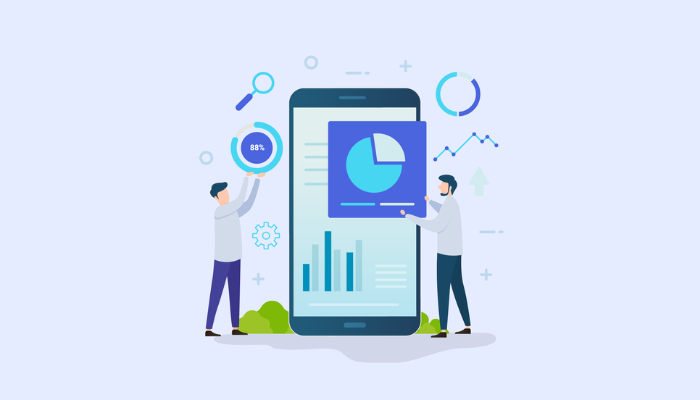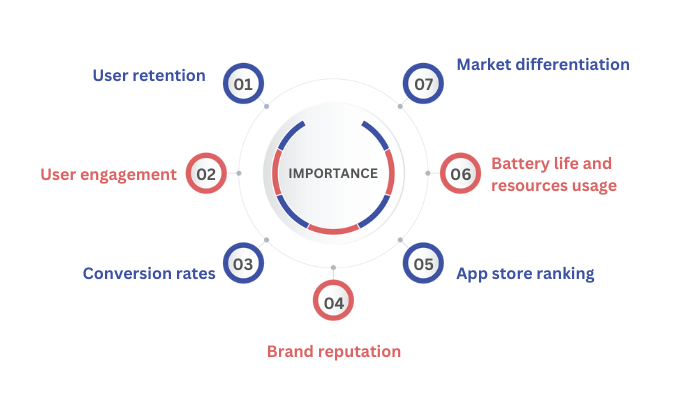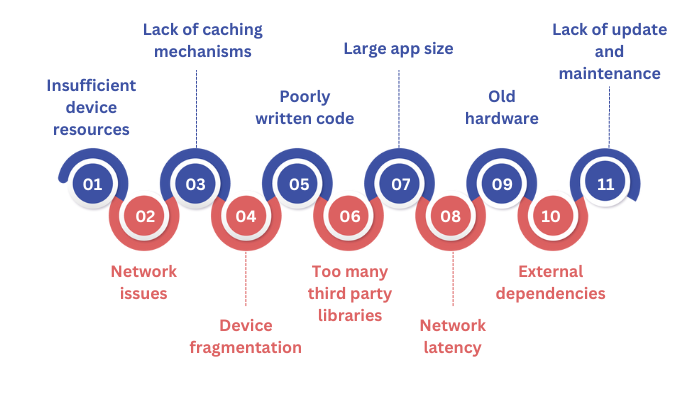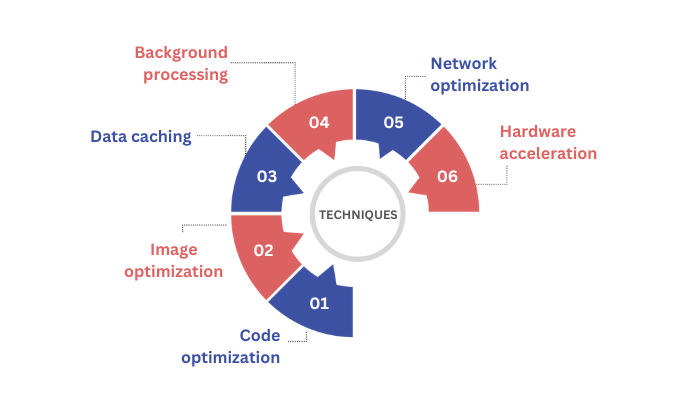53% of users abandoned a website if it takes more than three seconds to load. This is why app performance optimization is necessary. Three seconds! This is all it takes for potential customers to lose interest and seek alternatives.
Now, imagine the impact on the success of your app if it falls short of users’ expectations. Slow performance not only affects user satisfaction but also leads to lower engagement, decreased conversions & Ultimately missed business opportunities.
On the flip side, App performance optimization can drive higher user engagement, increased conversion, and improved customer loyalty.
21% of users abandon an app after one use, this means that after downloading an app, 1 out of every 4 users will never open it again.
There are several reasons why users abandon apps after use. Some of the most common reason includes:
- The app doesn’t meet user’s expectations
- The app is not user-friendly
- The app has too many ads
- The app is difficult to use
Thus, the average app loses 77% of users after three days. Within 30 days, 90% left. Within three months, 95% are gone – Andrew Chen, Andreessen Horowitz
App performance optimization is not just a one-time task. It’s an ongoing journey that requires continuous monitoring, analysis, and refinement. Technology evolves, user expectations evolve, and your app needs to keep up with the pace.
So, whether you are a seasoned developer or entrepreneur this blog provides insights into the evaluation of the performance of an application and devise solutions on how to improve the performance of an app.
What is Application Performance Optimization?

Application performance optimization refers to the process of improving the performance and efficiency of an application to ensure it operates at its optimal level.
It involves analyzing, identifying, and addressing bottlenecks, inefficiencies, and issues that can hinder the application’s speed, responsiveness, and overall user experience.
The goal of mobile app performance optimization is to enhance the performance metrics of an application such as time, scalability, and resource utilization. By optimizing application performance, organizations can deliver a seamless and satisfying user experience, increase customer satisfaction and gain a competitive edge in the market.
Understanding the components of your application
Most mobile applications are built with the framework available today. And optimizing them is necessary for the overall performance of the application.
Application include-
- CRUD operations for RDBMS and NO-SQL DBs
- Caching
- Async processing
- Batch processing
- APIs for processing business logic using different kinds of design patterns
- Scheduled data processing
Importance of Mobile App Performance Optimization

Mobile application performance optimization (APO) is of utmost importance in today’s digital landscape. It is crucial for the success and user satisfaction of mobile applications.
Here are some key reasons highlighting the importance of app performance optimization:
User retention
In fast pace life users have low tolerance for mobile apps that are slow, unresponsive, or crash frequently. Optimizing mobile app performance helps provide a smooth and seamless user experience, leading to improved user retention.
When users can navigate through an app effortlessly and perform tasks without frustration, they are more likely to continue using the app & recommend it to others.
User Engagement
Android app performance optimization offers faster response time that led to higher user engagement rates. When users can quickly access desired features and complete tasks efficiently they are more likely to spend more time within the app, interact with content and explore additional features.
Therefore, improved engagement translates into increased user satisfaction, loyalty, and potentially higher revenue generation.
Conversion rates
For mobile apps that involve e-commerce or transaction performance optimization is vital for driving conversion rates. Slow-loading screens or delays during the checkout process can lead to cart abandonment and lost sales opportunities.
By app performance optimization and reducing friction points, can improve conversion rates and maximize revenue generation.
Brand reputation
A poorly performing mobile app can tarnish a brand’s reputation. Negative reviews and feedback from users regarding performance issues can deter potential users from downloading or using the app.
On the other hand, a well-optimized mobile app that consistently delivers excellent performance enhances the brand’s reputation, establishing it as reliable, trustworthy, and committed to providing a high-quality user experience.
App store ranking
Both the apple app store and Google play store consider app performance and user experience when determining app rankings. Whether it’s ios app performance optimization or android app, if you want your app to be successful you have to work on its performance.
Apps that consistently perform well and have positive user reviews are more likely to rank higher in search results and gain visibility among potential users.
Optimizing mobile app performance, therefore contributes to better visibility, increased downloads, and organic growth.
Battery life and resources usage
Poor apps to optimize Android performance can drain device battery life quickly or consume excessive device resources such as CPU and memory. This negatively impacts user experience and can lead to frustration and device performance issues.
By optimizing mobile app performance, developers can minimize resource usage, improve battery efficiency and ensure a smoother user experience.
Market differentiation
A well-optimized mobile app that consistently performs well stands out in the market. Users are more likely to choose an app that delivers fast, reliable performance over alternatives that may suffer from slow load times or crashes.
Benefits of implementing Application Performance Optimization
Implementing application performance optimization brings a multitude of benefits for businesses and their applications. Here are some key advantages of implementing APO:
| Enhanced User experience
| APO significantly improves the user experience by ensuring that applications are fast, responsive and provide a seamless interaction flow. Users appreciate applications that load quickly and respond promptly to their actions. |
| Increased user engagement and retention
| When applications perform optimally, users are more likely to stay engaged and continue to use the application.
|
| Improved conversion rates
| APO plays a crucial role in enhancing conversion rates, especially for applications that involve e-commerce or transactional processes.
|
| Competitive advantages
| Apps that load faster, respond quickly, and deliver optimal performance gain competitive advantages over their counterparts.
|
| Cost savings
| It can result in cost savings by optimizing resource utilization. Well-optimized apps require fewer server resources reducing infrastructure costs.
|
| Scalability and reliability
| It ensures that applications are scalable and can handle increased user traffic. Plus, demand without compromising performance.
|
| Positive brand image and reputation
| APO contributes to a positive brand image and reputation which eventually led to attracting new users and fosters customer trust.
|
| Better analytics and insights
| It involves implementing performance monitoring and analytics tools which provide valuable insights into the app usage, response times, and user behavior.
|
What causes problems in mobile app performance?

If you want your mobile app to be successful, you have to work on its overall performance.
And you can do that by doing app performance optimization, or you can do testing for optimizing bugs and errors. But some issues cannot be rectified via mobile app testing because they create a direct impact on the overall performance of the application.
With this being said, we shall be discussing these issues. Therefore, these are mentioned below:
Insufficient device resources
Mobile devices have limited resources such as processing power, memory, and battery life. If an app consumes excessive resources or doesn’t optimize resource usage effectively, this can lead to slow performance. Plus, drains the device’s battery quickly.
Network issues
Some mobile apps often rely on network connectivity to fetch data, communicate with servers, or access external services. Slow or unreliable network connections, high latency, or network congestion can cause delays in data retrieval leading to poor app performance.
Lack of caching mechanisms
Without proper caching mechanisms, mobile apps may repeatedly retrieve the same data from remote servers, leading to increased network traffic and slower performance.
Caching commonly accessed data locally can significantly improve app responsiveness and reduce network dependency.
Device fragmentation
The vast array of mobile devices with varying hardware specifications, screen sizes, and operating systems creates challenges for app developers.
Apps may not be optimized or tested thoroughly on all device configurations leading to compatibility issues and varying performance across devices.
Poorly written code
This can lead to inefficient algorithms, memory leaks, and application deadlocks.
Too many third-party libraries
Using too many third-party libraries can add unnecessary overhead and make the app slower.
Large app size
Apps that are too large can take a long time to download and install, and they can also use up a lot of storage space on the device.
Network latency
If the app needs to communicate with a remote server, network latency can cause delays in loading data and responding to user requests.
Old hardware
If the device that the app is running on is on hold or has low-end specifications, it may not be able to able to handle the demands of the app.
External dependencies
Mobile apps often rely on external services, APIs, or third-party libraries. Issues with these dependencies such as slow response time, downtime, or compatibility issues. It can directly affect the app’s performance.
Lack of updates and maintenance
Over time, mobile operating systems and frameworks evolve, introducing new features and optimization. Apps that are not regularly updated or maintained may become outdated and incompatible with the latest platform changes, leading to degraded performance.
Techniques of Mobile Application Performance Optimization

Mobile application performance optimization involves implementing various techniques to improve the performance of mobile applications.
Here are some commonly used techniques:
Code optimization
This involves writing efficient code that uses the available resources wisely. This can be done by using algorithms that are well suited for the task at hand, avoiding unnecessary loops and conditional statements, and using memory-efficient data structures.
Image optimization
This involves reducing the size of images without sacrificing their quality. This can be done by using lossy compression algorithms such as JPEG or by using vector graphics, such as SVG.
Data caching
Storing frequently accessed data in memory so that it does not have to be loaded from disk each time it is needed. This can significantly improve performance, such as downloading data or syncing with a server.
Background processing
Running tasks in the background so that they do not block the main thread. This can be used to perform tasks that do not require user interaction, such as downloading data or syncing with a server.
Network optimization
Using techniques to reduce the amount of data that needs to be transferred over the network. This can be done by using compression algorithms, caching data locally, or using CDN (Content delivery network).
Hardware acceleration
Using the hardware capabilities of the device to improve the performance of the app. This can be done by using graphics processing units (GPUs) to render graphics or by using specialized hardware for tasks such as video decoding.
Why choose Nimble AppGenie for APO
When it comes to application performance optimization (APO) choosing the right partner is crucial to ensure successful implementation and achieve desired results.
Nimble AppGenie stands out as a reliable choice for APO as they have extensive expertise and experience in mobile app development and optimization. We understand that each app has unique requirements, and we provide customized APO solutions.
Choosing us to help your business achieve significant improvements in mobile app performance
FAQs
Application Performance Optimization (APO) is the process of identifying and addressing bottlenecks in an application’s performance. This can improve the speed, responsiveness, and overall user experience of an application.
APO is important because it can improve the user experience of an application. When applications are slow or unresponsive, users are more likely to become frustrated and abandon them. APO can help to improve the user experience by making applications faster and more responsive.
The benefits of APO include:
- Improved user experience
- Increased customer satisfaction
- Reduced costs
- Improved security
- Increased compliance
Some of the most common causes of performance problems in applications include:
- Poorly written code
- Too many third-party libraries
- Large app size
- Network latency
- Old hardware
Some of the techniques that can be used to optimize application performance include:
- Code optimization
- Image optimization
- Data caching
- Background processing
- Network optimization
- Hardware acceleration
Several tools can be used to measure the performance of an application. Some of these tools include:
- Performance testing tools
- Profiling tools
- Log analysis tools
Several things can be done to improve the performance of an application. Some of these things include:
- Optimize the application’s code.
- Optimize the application’s images.
- Cache data.
- Use background processing.
- Optimize the application’s network calls.
- Use hardware acceleration.

Udai Singh is a senior content writer with over 6 years of experience in creating content for FinTech, eWallet, EdTech, and App Development. He is an expert in simplifying complex concepts and creating engaging content that resonates with the audience.
Table of Contents












No Comments
Comments are closed.